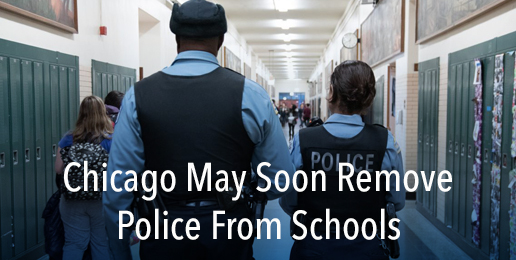
At the beginning of January, the news began to buzz with the report of Chicago alderman Nicholas Sposato, who told journalists that the city’s school system is looking into removing all police officers from high schools.

Up until only a few years ago, the city’s public high schools received two school resource officers each, but in 2019, they were granted the prerogative to decide whether they wanted to keep them or not.
Then, over the last few years, over two dozen high schools voted to remove both SROs, about the same number kept only one, and 16 schools still have both. If Sposato is correct, then the Chicago public schools system will soon be deciding whether to snatch all remaining officers away from those schools that still choose to keep them on site.
Chicago could decide on this before the end of the month, by the end of the year, or maybe not even for the foreseeable future. But in the meantime, here are a few thoughts on the idea of removing officers from schools.
Some argue that when officers are permanently on site, the school atmosphere is less likely to be peaceful. As an analyst for the National Education Association argues,
“Law enforcement creates more hostile environments, and when students perceive their schools to be hostile, they are less likely to be engaged in school and, in turn, demonstrate reduced achievement.”
Yet, no one—on either side of the debate—could reasonably deny that certain schools will still occasionally have to call the police to deal with violence that teachers can’t handle on their own.
So, the issue is not whether police will ever be on school grounds, but rather how frequently they will be called. This means that, for schools in neighborhoods that struggle with police-community relations, the police who end up appearing at school from time to time will be complete strangers to the kids, instead of the particular officers that they’ve seen and known around school for years.
The president of the Chicago Principals & Administrators Association recently argued this very point; referring to schools without a police presence, he observed that “you don’t have the SRO with the relationships. You have to call 911. . . . Cops with no relationships with the children show up, and you’re more likely to get the kind of interaction between cops and children.“
So, not having a police officer that the students know personally could end up making things worse when the police are really needed.
Others argue that schools with police empirically tend to report more offenses. (To be fair, research is still fuzzy on whether, as a general rule, SROs improve school safety. Here is a study that found decreased violence in middle schools with SROs, but here is a study that has found drug- and weapons-related offenses to be more frequent in schools with police present.)
When evaluating this research, however, it’s important to realize that “number of offenses” does not necessarily equate to “school safety”—a school with a police presence could very well report more offenses than a school without police simply because there’s a police officer permanently there.
So be cautious when reading sources that claim a causation from a mere correlation. As the latter study mentioned above openly admits,
“. . . recorded crime may increase simply because more crime is detected and recorded when police are present. That is, SRO presence may not influence actual levels of student behavior, but rather may increase the likelihood that such behavior, already present, will be formally recorded“ (p. 24).
Finally, however, even if police in schools did make most school environments hostile and more violent, there are always exceptions to the rule. Keep in mind that while two dozen high schools removed their police presence, two dozen more chose to keep one officer on site, and 16 more chose to keep both!
Evidently, those schools think that the benefits of police presence outweigh the cost (if any) to their school environment or the frequency of unruly behavior that they may be experiencing. As the principal of one Chicago high school told the press,
“I think a blanket (SRO) policy for the entire district in terms of safety is not the best” for his own school and others.”
So ultimately, why can’t each school decide what’s best in their own situation? This is a principle that America has historically held dear: make rules on the lowest level of government that is equipped to address the issue.
And why?
Because no matter how many schools fit perfectly well under a blanket generalization, there will always be one in a different circumstance which will be harmed rather than helped by it. Or maybe a couple dozen, in Chicago’s case?























